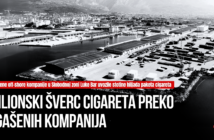 (Podgorica, 7 February 2013) – The Ministry of Sustainable Development only confirmed our suspicions that the process of issuing permits to MAT Company was undertaken, at the very least, in a non-transparent fashion. Whether someone was able to extract benefits from such a procedure, and in what amounts, should be left to the relevant state prosecutor to determine.
(Podgorica, 7 February 2013) – The Ministry of Sustainable Development only confirmed our suspicions that the process of issuing permits to MAT Company was undertaken, at the very least, in a non-transparent fashion. Whether someone was able to extract benefits from such a procedure, and in what amounts, should be left to the relevant state prosecutor to determine.
Nevertheless, for the purposes of adequately informing citizens, Minister Branimir Gvozdenović could declare through which procedure and by means of which law could an investor – in this case MAT Company – have submitted a request for a use permit before even beginning construction or having received a construction permit. The reverse sequence of steps in this case leaves ample room for suspicion that the official documentation was prepared solely for the purposes of legalizing a job retroactively.
Obviously, Šarić’s gas station isn’t the biggest urban planning issue in Montenegro, though it does offer further evidence of the degree to which state institutions remain captured by the will and interests of powerful individuals. It also points to the fact that certain government cadres, in this case Gvozdenović, clearly established a pattern of behaviour by which ‘strategic investors’ are allowed to behave any which way they please.
It is well known that this isn’t the first time Gvozenović has accommodated Montenegro’s “tough guys” and “strategic partners.” Prosecutors are still investigating two additional criminal charges filed by MANS against him. The first relates to the legalization of a hotel built on a parcel of land owned by the controversial Nikšić-based businessman Brano Mićunović, while the second deals with the legalization of a residential building in Bar that was built by the coastal city’s mayor Žarko Pavićević and Miodrag Đurović (the brother of Kardinal – convicted for the murder of the journalist Ivo Pukanić).
We believe that Gvozdenović’s ‘biography,’ accompanied with undeniable material evidence, definitely merits the attention of Montenegro’s police and prosecutors and that the conditions for investigating the ties and relations between senior state officials, political functionaries and members of the criminal milieu in Montenegro have been met a long time ago.



